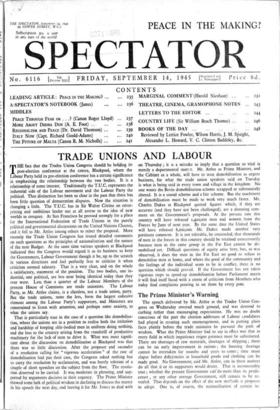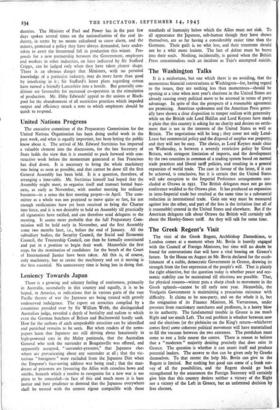The Prime Minister's Warning
The speech delivered by Mr. Attlee at the Trades Union Con- gress on Wednesday covered much ground, and was devoted to curbing rather than encouraging expectations. He was no doubt conscious of the part the election addresses of Labour candidates had played in creating such encouragement, and in putting plain facts plainly before the trade unionists he pursued the path of wisdom. What the Prime Minister had to say in effect was that in every field in which impatience reigns patience must be substituted. There are shortages of raw materials, shortages of shipping ; there can be no early improvement in rations ; the housing shortage cannot be overtaken for months and years to come ; time must elapse before deficiencies in household goods and clothing can be made good. No Government, said Mr. Attlee, can in these matters do all that it or its supporters would desire. That is incontestably true ; whether the present Government cad do more than its prede- cessor , or any other average Government, still remain to be re- vealed. That depends on the effect of the new methods it proposes to adopt. One is, of course, the nationalisation of certain in-
dustries. The Minister of Fuel and Power has in the past few days spoken several times on the nationalisation of the coal in- dustry, in terms by no means calculated to cause alarm, and the miners, promised a policy they have always demanded, have under- taken to avert the threatened fall in production this winter. Pro- posals for a new partnership between the Government, employers and workers in other industries, on lines indicated by Sir Stafford Cripps, can be judged only when they have taken .clearer shape. There is an obvious danger that Ministers, with no personal knowledge of a particular industry, may do more harm than good by interfering in it ; Sir Stafford's latest plans regarding cotton have turned a friendly Lancashire into a hostile. But generally con- ditions are favourable for increased co-operation in the stimulation of production. Mr. Ebby Edwards' appeal to the unions at Black- pool for the abandonment of all restrictive practices which impeded output and efficiency struck a note to which employers should be quick to respond.



























